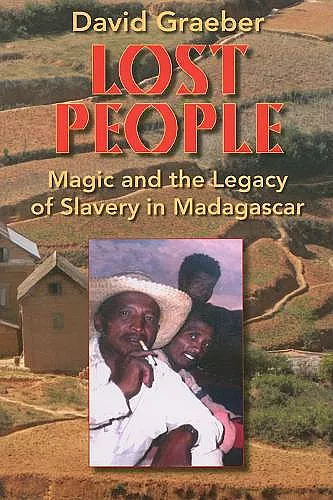Lost People
Magic and the Legacy of Slavery in Madagascar
Format:Paperback
Publisher:Indiana University Press
Published:26th Sep '07
£25.99
Available to order, but very limited on stock - if we have issues obtaining a copy, we will let you know.

An epic account of the power of memory in Madagascar
Betafo, a rural community in central Madagascar, is divided between descendants of nobles and descendants of slaves. Anthropologist David Graeber uncovers the layers of historical, social, and cultural knowledge required to understand a disastrous communal ordeal and elaborates a new view of power, inequality, and the political role of narrative.
Betafo, a rural community in central Madagascar, is divided between the descendants of nobles and descendants of slaves. Anthropologist David Graeber arrived for fieldwork at the height of tensions attributed to a disastrous communal ordeal two years earlier. As Graeber uncovers the layers of historical, social, and cultural knowledge required to understand this event, he elaborates a new view of power, inequality, and the political role of narrative. Combining theoretical subtlety, a compelling narrative line, and vividly drawn characters, Lost People is a singular contribution to the anthropology of politics and the literature on ethnographic writing.
This compelling ethnography matches Bakhtinian dialogism with Dostoevskian detail. The book is 'full of characters: both in the sense of eccentrics and oddballs, and . . . of protagonists of stories . . . about the edges between politics and history,' where assumptions are negotiated and 'new things can emerge.' Madagascar's blend of African and Pacific cultures and histories is highly unusual, and innovative tactics are needed to capture and convey its singularities. Dark Dostoevskian portrayals prove apposite to understanding people who do 'not see anything particularly shameful about fear' in both religious and political realms. Highly articulated social stratification meant that aristocrats and slaves cohabited precolonial places and periods. With French conquest and subsequent abolition, these categories shifted rather than disappeared as elites managed their newfound sharecroppers. Graeber (Goldsmiths, Univ. of London) is a masterful narrator, allowing contradictions in people's accounts to be what they are—different takes on given circumstances—as he brokers more speculative hypotheses and historical understandings about the nature of society. A humanistic sense of flow results, as Graeber talks with and about people while shedding light on the paradoxically 'perverse, extreme scientism' of postmodernist quests for 'real knowledge.' Summing Up: Recommended. Upper-division undergraduates and above.
-- A. F. Roberts * Choice *Graeber leads us in an engaging manner through a succession of rich narratives obtained through taped interviews, superbly analysed ethnographic encounters, and sharp arguments based on a thorough knowledge of the ethnographical record and historical archives, including state records. . . . In trying to present an ethnography that is both honest and not written and structured exclusively for 'the market', Graeber does well to treat the ordinary (and extraordinary) people of Befato as 'historical characters' and as historians in their own right.Fall 2009
* African Studies Quarterly *[T]his book will be useful for those readers seeking a detailed analysis of the workings of everyday politics in a small community, a politics that involves creating stories that combine the everyday with the eternal, giving mortal characters the possibility for eternal influence over their descendants.May 2010
* American Ethnologist *This rich book . . . provides us with an innovative account of the political nature of the apparently unpolitical.Volume 52, Number 1, April 2009
-- Eva Keller * University of Zürich *What makes Lost People an extraordinary book is its freedom of thought. It is important not because of its position in the next round of anthropological debates but because of the graceful eclecticism of the author's perceptual and creative range. One hopes that ethnography built on such foundations will be treasured by anthropology today and tomorrow.Vol. 50.6 Dec. 2009
-- Yancey Orr * University of Arizona *This compelling ethnography matches Bakhtinian dialogism with Dostoevskian detail. . . . Graeber . . . is a masterful narrator, allowing contradictions in people's accounts to be what they are—different takes on given circumstances—as he brokers more speculative hypotheses and historical understandings about the nature of society. A humanistic sense of flow results, as Graeber talks with and about people while shedding light on the paradoxically 'perverse, extreme scientism' of postmodernist quests for 'real knowledge.' . . . Recommended.September 2008
-- A. F. Roberts * University of California, Los AngelISBN: 9780253219152
Dimensions: unknown
Weight: unknown
488 pages